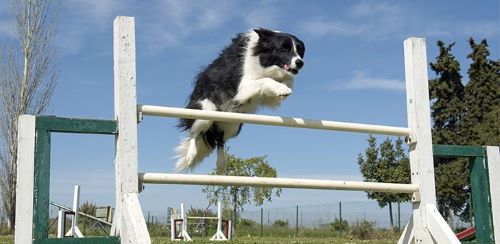Genetics of Border Collie Collapse
Border Collie Collapse (BCC) is a nervous system disorder seen in Border Collies and related breeds including Australian Shepherds, Kelpies, Bearded Collies, Shetland Sheepdogs, and Whippets. It is characterized by intermittent episodes of disorientation and a wobbly/staggering gait within 5-15 minutes of strenuous exercise such as agility, flyball, retrieving, or herding. Dogs usually return to normal within 30 minutes of rest and show no laboratory abnormalities consistent with heat stroke or heat exhaustion. While a similar clinical disorder is seen in Labrador Retrievers (Exercise-Induced Collapse or EIC), the genetic mutation causing EIC is not found in affected Border Collies.

Border Collie Collapse is a moderately to highly heritable, complex disease that is influenced by many genetic mutations and environmental factors.
To better understand this unique disorder, AKC Canine Health Foundation (CHF) funded investigators at the University of Minnesota have been studying Border Collies and related breeds affected by BCC. They characterized the clinical and physiologic signs of BCC and examined the genetic factors that influence this disorder.1
Thanks to the Border Collie Society of America and Border Collie owners across the globe, DNA samples from 343 Border Collies were analyzed. SNPs, pronounced ‘snips’ for single nucleotide polymorphisms or differences in a single DNA building block called a nucleotide, were studied to help investigators estimate the heritability of BCC at 49-61%. That means that approximately half of disease risk is due to genetic factors, not environmental or other factors. Searching for specific mutations or SNPs associated with BCC revealed hundreds of locations on various chromosomes that could influence disease risk. These results confirm that BCC is a moderately to highly heritable, complex disease that is influenced by many genetic mutations and environmental factors.
While BCC is not a simple disease, scientists now have a better understanding of how many genetic mutations influence its development, how much influence the different mutations contribute, how common each mutation is, and how they interact with environmental triggers. Future research will refine the search for influential genetic mutations with the goal of developing genetic tests and targeted treatments for this complex disorder. Learn more about CHF-funded research into EIC, BCC, and other neurologic diseases at akcchf.org/neurologyRPA.
- Norton, E. M., Minor, K. M., Taylor, S. M., McCue, M. E., & Mickelson, J. R. (2021). Heritability and Genomic Architecture of Episodic Exercise-Induced Collapse in Border Collies. Genes, 12(12), 1927. https://doi.org/10.3390/genes12121927
Related Articles
Help Future Generations of Dogs
Participate in canine health research by providing samples or by enrolling in a clinical trial. Samples are needed from healthy dogs and dogs affected by specific diseases.



